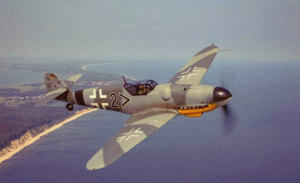Norderstedt EF-51: Difference between revisions
No edit summary |
No edit summary |
||
| (2 intermediate revisions by the same user not shown) | |||
| Line 2: | Line 2: | ||
|name = Norderstedt EF-51 | |name = Norderstedt EF-51 | ||
|image = Image:EF51BlackTwo.png | |image = Image:EF51BlackTwo.png | ||
|caption = EF-51K-4 ''Svarta två'' as flown by [[ | |caption = EF-51K-4 ''Svarta två'' as flown by [[Matthias Virtanen]] in 1955, currently preserved at the National Aviation Museum Kongsberg | ||
}}{{Infobox aircraft type | }}{{Infobox aircraft type | ||
|type = {{wpl|Fighter aircraft|Fighter}} | |type = {{wpl|Fighter aircraft|Fighter}} | ||
| Line 26: | Line 26: | ||
|} | |} | ||
The '''Norderstedt EF-51''' is an Acrean [[Great Eracuran War|Great War]]-era piston fighter aircraft. Produced in very high volume throughout the 1930s, the EF-51 was one of the most advanced aviation designs in use when it first appeared in 1932. The EF-51 was highly regarded by its pilots for its high-speed performance and armament, being one of the fastest piston-engine fighters of its time with an excellent climb rate and centerline nose-mounted cannons. The fighter excelled primarily | The '''Norderstedt EF-51''' is an Acrean [[Great Eracuran War|Great War]]-era piston fighter aircraft. Produced in very high volume throughout the 1930s, the EF-51 was one of the most advanced aviation designs in use when it first appeared in 1932. The EF-51 was highly regarded by its pilots for its high-speed performance and armament, being one of the fastest piston-engine fighters of its time with an excellent climb rate and centerline nose-mounted cannons. The fighter excelled primarily high altitudes, where it had equal or superior maneuverability to most other contemporary Acrean piston fighters. Later EF-51G and EF-51K series aircraft were equipped with maneuvering slats which improved the aircraft's maneuverability at mid to low altitude. The EF-51, alongside the [[Aestrup EF-59|EF-59]], formed the backbone of the [[Royal Acrean Air Force|RAAF's]] fighter fleet for over a decade, eventually being supplemented and replaced by newer jet fighters such as the [[Aestrup EF-62|EF-62]]. | ||
==Development== | ==Development== | ||
| Line 44: | Line 44: | ||
* '''Wing Area:''' 16.05 sq m (172.8 sq ft) | * '''Wing Area:''' 16.05 sq m (172.8 sq ft) | ||
* '''Empty Weight:''' 2,247 kg (4,954 lb) | * '''Empty Weight:''' 2,247 kg (4,954 lb) | ||
* '''Powerplant:''' 1 x Mattson-Dyrssen MD605KA-1 inverted V12 piston engine ( | * '''Powerplant:''' 1 x Mattson-Dyrssen MD605KA-1 inverted V12 piston engine (1956 hp) | ||
===Performance=== | ===Performance=== | ||
Latest revision as of 11:28, 5 February 2022
| Norderstedt EF-51 | |
|---|---|

| |
| EF-51K-4 Svarta två as flown by Matthias Virtanen in 1955, currently preserved at the National Aviation Museum Kongsberg | |
| Role | Fighter |
| National origin | |
| Manufacturer | Norderstedt Avia GmbH |
| First flight | 1928 |
| Introduction | 1932 |
| Retired | 1953 (Acrea) |
| Status | Retired |
| Primary user | |
| Produced | 1930-1943 |
The Norderstedt EF-51 is an Acrean Great War-era piston fighter aircraft. Produced in very high volume throughout the 1930s, the EF-51 was one of the most advanced aviation designs in use when it first appeared in 1932. The EF-51 was highly regarded by its pilots for its high-speed performance and armament, being one of the fastest piston-engine fighters of its time with an excellent climb rate and centerline nose-mounted cannons. The fighter excelled primarily high altitudes, where it had equal or superior maneuverability to most other contemporary Acrean piston fighters. Later EF-51G and EF-51K series aircraft were equipped with maneuvering slats which improved the aircraft's maneuverability at mid to low altitude. The EF-51, alongside the EF-59, formed the backbone of the RAAF's fighter fleet for over a decade, eventually being supplemented and replaced by newer jet fighters such as the EF-62.
Development
Design
Operational History
Variants
Operators
Specifications (EF-51K-4)
General Characteristics
- Crew: 1
- Length: 8.95 m (29 ft 4 in)
- Wingspan: 9.925 m (32 ft 7 in)
- Height: 2.6 m (8 ft 6 in)
- Wing Area: 16.05 sq m (172.8 sq ft)
- Empty Weight: 2,247 kg (4,954 lb)
- Powerplant: 1 x Mattson-Dyrssen MD605KA-1 inverted V12 piston engine (1956 hp)
Performance
- Maximum Speed: 730 km/h (454 mph) at 6000 m
- Service Ceiling: 12,800 m
Armament
- Guns: 1 x 20mm revolver cannon or 1 x 30mm revolver cannon, 2 x 13.2mm machine guns
See Also
- Aircraft of Comparable Role, Configuration, and Era
